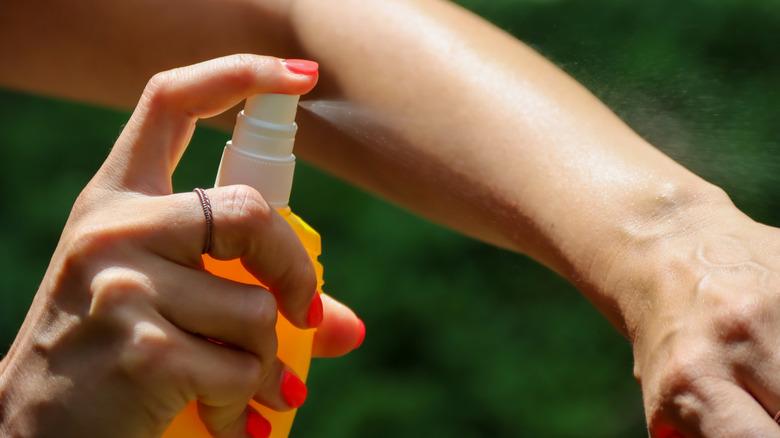Ward Off Mosquitoes With The Help Of A Distinct Fragrance They Can't Tolerate
We may receive a commission on purchases made from links.
It's hard to feel kindly about mosquitoes, even though they play important roles in ecosystems as pollinators and a food source for some of humans' favorite animals, like turtles, hummingbirds, dragonflies, and bats. Yet that's hardly any consolation to even the most ardent nature lover when they can't fall asleep at night because they're itching and scratching from mosquito bites. There are ways to be kind to nature and ward off mosquitoes at the same time. There's no reason to resort to chemical pesticides, since many alternative are available. Pine oil is one of the most powerful essential oils when it comes to repelling mosquitoes. It's safe, natural, and easy to prepare at home.
While there are many commercial mosquito repellents you can buy, many rely on synthetic chemicals with known environmental and human hazards. Commonly used chemicals in mosquito repellents include synthetic pyrethroids, which can be highly toxic to humans, and cyfluthrin, which is credibly linked to the decline in honeybees. Mosquitoes have become increasingly resistant to chemical insecticides, making them less effective. By contrast, pine oil is simply extracted from pine tree needles. A systematic review of all plant-based mosquito repellents found excellent repellency among numerous essential oils, with pine oil ranking third. The only widely available oil to come out ahead was citronella. You could use lemon juice as a mosquito repellent, but it you don't prefer the smell, pine oil with its distinctive, outdoorsy scent comes in a close second. Pine oil contains 19 different compounds, including terpinene, which has the highest repellent activity among compounds found in essential oils. How should you best apply it?
How to make your own pine oil mosquito repellent
You can make your own mosquito repellent lotion out of pine oil, which is available in many herbal shops or on Amazon. Like other essential oils, pine oil comes in a highly concentrated form, so it should be diluted for use. When handling the undiluted form, wear gloves and eye protection, as it can be an eye or skin irritant. Keep it out of the reach of children, as undiluted pine oil can be toxic if ingested or inhaled. Essential oil repellents should not be used on children under age 2. Pine oil also can be a skin irritant to pets and toxic if ingested. Please consult a physician and veterinarian before using if either scenario applies to you. That said, using pine oil as a mosquito repellent is a better, safer alternative to commercial repellents that use synthetic chemicals.
To make your own pine oil mosquito repellent, simply add a few drops of the oil to a few tablespoons of a carrier oil, like olive oil or coconut oil. (Since you only need a few drops, you can repurpose your extra pine oil by mixing it with vinegar to make your own home-made Pine-Sol.) If making a large batch of repellent, you can add a vitamin E capsule as a preservative. Mix your oils in a dark glass jar or spray bottle to prevent the mix from becoming rancid over time. Test your repellent on a patch of your skin. If your skin becomes irritated, please discontinue use and consult a physician. You can dilute your repellent further or make an insect repellent with vanilla extract or cinnamon oil. Store the repellent in a cool place and use it as you would any other lotion.

